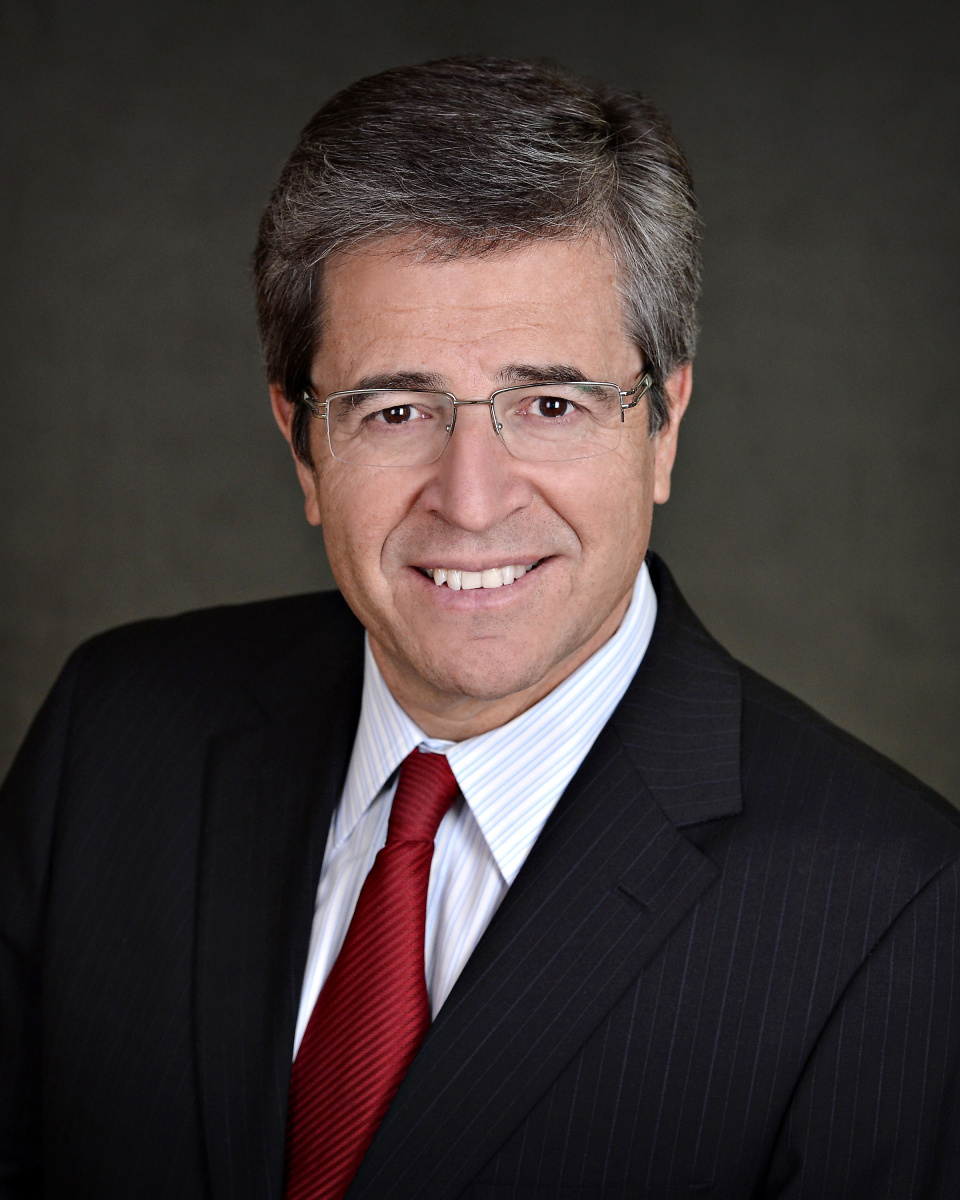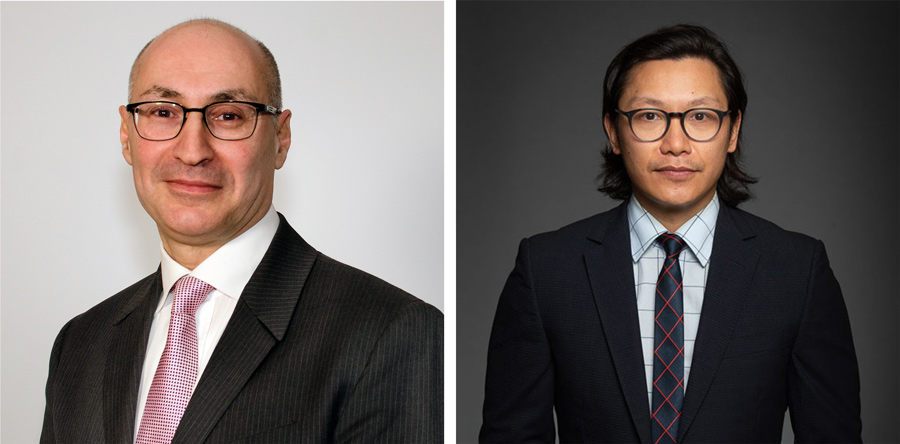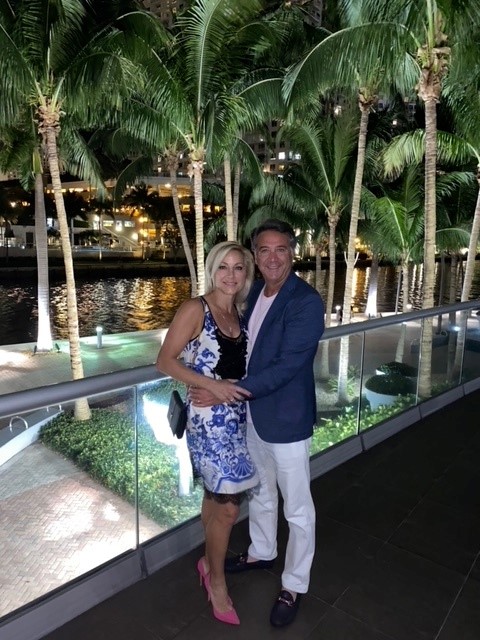Dr. Thierry Mesana’s legacy as the valve surgeon at the helm of the Heart Institute lives on with significant endowment from a former patient
Thierry Mesana, MD, is nearing the end of his second term as president and CEO of the University of Ottawa Heart Institute. The heart valve surgeon who revolutionized treatment of cardiovascular disease – Mesana literally wrote the book on advancing patient-centered cardiac care – has performed thousands of life-saving surgeries over his decades-long career. And while he said he remembers every case, he admitted there is a special spot in his heart for one patient in particular: John Bassi.
This is the story of how one man’s gratitude for the surgeon who saved his life inspired a legacy fund in his name, paving the road for research, innovation, and better care for tens of thousands of heart patients.
John Bassi
At 44, John Bassi was a successful businessman and community builder, happily married, and the father of two boys. Still, something wasn’t right.
Though he considered himself healthy and active for his age – fit enough to play pick-up soccer with friends – John felt exhausted every day.
Long working hours and a demanding social schedule were catching up to him, he thought. His energy levels were dipping, and friends and family were starting to notice.
At the time, John was a member of the University of Ottawa Heart Institute Foundation’s board of directors. One morning, while attending a meeting, John revealed to his colleagues how tired he had been feeling.
“John, when was the last time you had your health checked?” they asked.
John hadn’t considered this. Confident his experiences were par for the course, and the exhaustion he lived with was indicative of his busy lifestyle, he made plans to meet with his doctor.
He didn’t know it then, but that decision ultimately saved his life.
John was diagnosed with a mitral valve prolapse, one of the most common types of valvular heart disease among men his age. He would need open-heart surgery to repair the defective valve that was leaking blood between the left chambers of his heart, forcing it to work double-time.
“It was a shock to me and my family,” John recalled. “My whole world was suddenly changing. I kept thinking about what would happen if things didn’t work out.”
Without treatment, John’s condition would continue to progress, increasing his risk of developing more serious complications – arrhythmia, heart failure, stroke, hypertension, and if left untreated long enough, even death.
The next epidemic of heart diseases
Cases like John’s are nothing new.
Despite continuous improvements in the diagnosis, evaluation, and treatment of patients with valvular heart disease, cardiologists believe conditions like John’s represent the next epidemic of heart disease.
David Messika-Zeitoun, MD, is a cardiologist and director of the Centre for Valvular Heart Disease (CVHD) at the University of Ottawa Heart Institute (UOHI). He said heart valve disease is all too common, affecting nearly 25% of patients admitted to hospital for cardiovascular reasons.
Patients with valvular heart disease are underdiagnosed, referred late in the course of the disease, and are often undertreated, leading to increased risk of complications and mortality.
- David Messika-Zeitoun, MD
“Patients with valvular heart disease are underdiagnosed, referred late in the course of the disease, and are often undertreated, leading to increased risk of complications and mortality,” said Messika-Zeitoun. “It’s awfully sad because we’re not talking about cancer. Most valvular heart diseases are treatable.”
Whereas some heart conditions may be effectively managed with drugs, Messika-Zeitoun said there is no known medication that can cure valvular heart disease on its own. Without research, Messika-Zeitoun’s fear is a growing subset of the population will develop severe progressions of the disease that will eventually need an intervention.
Vincent Chan, MD, a cardiac surgeon at the UOHI, has operated on hundreds of patients with such progressions. Expert in valve repairs, replacements, and minimally invasive treatments, Dr. Chan said medical research has a crucial role to play in the operating room, in the catheterization lab, as well as in the examination room.
"There are a number of techniques we use for which there is limited data available," said Chan. "In addition to improving surgical techniques and outcomes, research helps care teams identify the ideal strategy to manage each pathology of disease. Researchers analyzing valve disease provide surgeons with nuanced guidance in the OR, as well as an indication of the outcome they may expect."
Since it opened in 2019, the CVHD has provided state-of-the-art evaluation, second opinions, and care to patients with heart valve disease. More than 20% of those referred to the clinic are passed onto Chan and his team for life-saving intervention, Messika-Zeitoun estimated. It’s a rate cardiologists, cardiac surgeons, nurses and research coordinators are working in tandem to study.
To this effect, CVHD patients are offered to join the centre’s research registry, a database containing information about patients’ baseline characteristics and outcomes. Researchers consult the registry to better understand the mechanisms and natural history of valvular heart disease. Patients are also invited to participate in the CVHD “biobank,” where de-identified blood samples are collected and retained for future research.
“Our main aim is to provide personalized care to patients with valvular heart disease and to perform timely interventions,” said Messika-Zeitoun. “At the same time, we are continuously exploring innovative ways to improve screening and detection, developing and testing medications, and simulating interventions to advance care and improve outcomes. It’s about ensuring patients like John Bassi receive timely access to treatment that enhances their quality of life.”
One of the greats
John Bassi was referred into to the care of Thierry Mesana, MD, then the head of the UOHI’s Division of Cardiac Surgery, and currently the institute’s president and CEO.

Mesana was a specialist in repairing failing heart valves, a surgeon world-renown as much for his technical skill and ability as his leadership in academia. Under Mesana’s tutelage, the UOHI’s surgical and valve repair program had expanded dramatically to become recognized as one of the best in the world. Mesana, too, was highly respected as “one of the greats” in the industry. His emphasis on repairing heart valves (rather than replacing them with artificial or biological alternatives) helped to establish this approach as the gold standard for treatment.
For John, who had been seeking a second opinion, this was all the reassurance he needed.
“When the doctor found out Dr. Mesana was going to be my surgeon, he basically handed me back my file and told me to go home. He assured me I was in great hands,” John laughed. “It was just incredible. When you hear that, you realize you’re going to be okay.”
Four months after his diagnosis, John underwent a successful open-heart surgery. Mesana and his medical team were able to repair his prolapsed mitral valve. John said he noticed improvements in his health right away, his energy returning “almost immediately.” Within days of the operation, he was recovering at home. Four weeks later, he returned to work.
More than a decade after the surgery, John was overcome with emotion when asked to reflect on his experience and the relationship he shares with the surgeon he affectionately calls “Superman.”
“The care I received was a ten out of ten. Honestly, the staff and the nurses… I want to cry when I think about it,” he said. “Not only is Dr. Mesana a fantastic leader and businessman, but he’s also a fantastic person with outstanding bedside manners. He’s like a friend to me.”
The legacy of a heart surgeon, president and CEO
Though no longer on the Heart Institute Foundation’s board of directors, John Bassi and Thierry Mesana keep in touch to this day. John and his wife Maria continue to financially support the institute that saved his life. They encourage their peers, business associates, and everyone they meet to donate generously.
With the Bassis’ support, and with support from the community, the UOHI Foundation has established an endowment fund for heart valve research in Mesana’s name.
With an initial amount of $4 million, the Dr. T. G. Mesana Endowed Team Chair in Heart Valve Disease is one of the largest – if not the lagest – chairs dedicated to a cardiovascular research program in Canada.

The team chair will be held and co-chaired by one cardiologist and one cardiac surgeon: Drs. David Messika-Zeitoun and Vincent Chan are the first to serve five-year mandates.
“Dr. Mesana has always said a world-class centre cannot be considered world-class without a strong group in valvular heart disease,” said Messika-Zeitoun. “This was his vision from the beginning. When people think of heart valve disease in Canada, we want them to think of the University of Ottawa Heart Institute. This is Mesana’s legacy.”
Building on the shoulders of Dr. Wilbert J. Keon, Thierry Mesana has elevated the Heart Institute to be a global leader in team-based care.
- Vincent Chan, MD
“Building on the shoulders of Dr. Wilbert J. Keon, Thierry Mesana has elevated the Heart Institute to be a global leader in team-based care,” said Chan. “I am humbled to be among the first to continue his important legacy.”
Messika-Zeitoun and Chan will steer a wide range of research projects and provide academic leadership and direction in keeping with the vision and objectives of the Division of Cardiac Surgery, the Division of Cardiology, and the UOHI.
Their work will support the “heart team” concept Mesana established during his tenure as president and CEO, an approach which allows for interdisciplinary and personalized care for each patient.
“An endowment such as this provides the essential framework to ensure funding for life-saving research in valvular heart disease exists now and for many more years to come,” said Mesana. “Knowing my legacy will have a positive impact on the culture of the Heart Institute, the community here in Ottawa, and for so many patients with valvular heart disease is truly special.”
“I am eternally thankful and grateful to John Bassi and his wife Maria for all their efforts. John is a big supporter of the Ottawa community, a lover of our city, and we sincerely appreciate having people like him and Maria supporting the Heart Institute.”
Never miss a Beat
Want interesting stories like this delivered straight to your inbox as they happen? Subscribe to our mailing list.


